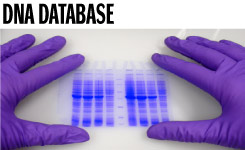Police May Take DNA Sample without Warrant after Arrest, Supreme Court Rules in Unusual Split Decision

In a decision (pdf) that saw a conservative justice vote with his liberal colleagues, and a liberal side with conservatives, the U.S. Supreme Court ruled this week that police—without a warrant—can legally obtain DNA samples from people arrested in connection with serious crimes.
Five members of the high court concluded that it’s okay for law enforcement to conduct DNA tests—for purposes of identifying the suspect in custody. The rationale was surprising, because the argument for DNA testing by police has centered on finding those responsible for unsolved crimes.
Nevertheless, three of the court’s conservative judges—Chief Justice John Roberts and Justices Clarence Thomas and Samuel A. Alito Jr.—joined with liberal justice Stephen Breyer and swing-vote Anthony Kennedy to uphold the conviction of a Maryland man who was charged with rape after his DNA was collected following his arrest for a different crime.
The 2003 rape case had gone unsolved, and it wasn’t until Alonzo King Jr. was arrested in 2009—for assault with a shotgun—that he was identified as the rapist after police took a swab of his DNA and tested it. King’s conviction was subsequently set aside by the Maryland Court of Appeals, which determined that the swab taken from King’s inner cheek constituted an unreasonable search, in violation of the Fourth Amendment of the U.S. Constitution.
“When officers make an arrest supported by probable cause to hold for a serious offense and they bring the suspect to the station to be detained in custody,” Kennedy wrote for the majority, “taking and analyzing a cheek swab of the arrestee’s DNA is, like fingerprinting and photographing, a legitimate police booking procedure that is reasonable under the Fourth Amendment.”
But Justice Antonin Scalia, who ordinarily sides with Roberts, Thomas and Alito, joined with the court’s liberal wing to vote in the minority. A staunch believer in the Fourth Amendment, which protects against unlawful search and seizures, Scalia accused the majority of taxing “the credulity of the credulous” by justifying DNA testing on grounds of use to identify suspects.
Scalia supported this by noting that it wasn’t until several days following King’s arrest—long after he had been identified—that his DNA was tested, and months before the sample was matched to the rape evidence. Furthermore, he said, King’s DNA was not compared to a database for identification purposes, but to a cold case database whose DNA samples lacked identification.
“Make no mistake about it,” wrote Scalia in his dissent. “As an entirely predictable consequence of today's decision, your DNA can be taken and entered into a national DNA database if you are ever arrested, rightly or wrongly, and for whatever reason. Today's judgment will, to be sure, have the beneficial effect of solving more crimes; then again, so would the taking of DNA samples from anyone who flies on an airplane… applies for a driver's license, or attends a public school.”
"Solving unsolved crimes is a noble objective,” he added, “but it occupies a lower place in the American pantheon of noble objectives than the protection of our people from suspicionless law-enforcement searches. The Fourth Amendment must prevail.”
Scalia was joined by Justices Ruth Bader Ginsburg, Sonia Sotomayor and Elena Kagan in his dissent.
The federal government, along with 28 states, has laws that permit DNA sampling and testing of arrestees.
-Danny Biederman, Noel Brinkerhoff
To Learn More:
Supreme Court Backs Maryland's Controversial DNA Collection Law (Courthouse News Service)
Justices Allow DNA Collection after an Arrest (by Adam Liptak, New York Times)
Supreme Court Upholds Maryland Law, Says Police May Take DNA Samples from Arrestees (by Robert Barnes, Washington Post)
Supreme Court OKs Taking DNA from Arrestees (by David Kravets, Wired)
Court Ruling: Maryland v. King (U.S. Supreme Court) (pdf)
Lawsuit Tries to Keep Uncharged and Unconvicted Arrestees out of DNA Database (by Ken Broder, AllGov)
Maryland Law Enforcement in Limbo as State High Court Rules DNA Sampling of Suspects is Prohibited (by Noel Brinkerhoff, AllGov)
- Top Stories
- Unusual News
- Where is the Money Going?
- Controversies
- U.S. and the World
- Appointments and Resignations
- Latest News
- Musk and Trump Fire Members of Congress
- Trump Calls for Violent Street Demonstrations Against Himself
- Trump Changes Name of Republican Party
- The 2024 Election By the Numbers
- Bashar al-Assad—The Fall of a Rabid AntiSemite






Comments